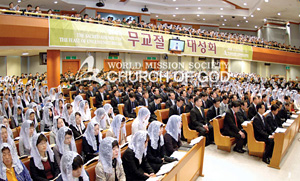The day after the Passover (the 15th day of the 1st month in the sacred calendar), the Feast of Unleavened Bread to commemorate the sacrifice of Christ who died on the cross was solemnly kept in addition to the Sabbath.
The Feast of Unleavened Bread is a feast to commemorate the suffering that the Israelites experienced until they crossed the Red Sea after they celebrated the Passover and left Egypt the next day, being chased by the Egyptian army. In the Old Testament times, the people remembered the suffering by eating unleavened bread (bread without yeast) and bitter herbs (Lev 23:5-6; Ex 14; Deut 16:3). The suffering the Israelites experienced represents the suffering Jesus underwent from the night when He began to carry the cross after celebrating the Passover with His disciples until His physical body died on the cross (Matt 27:1-50; Isa 53). In the New Testament times, God’s people are to participate in the suffering of Christ from midnight on the Passover until 3 p.m. at the Feast of Unleavened Bread when Jesus breathed His last, as the Bible says, “But the days will come when the bridegroom is taken away from them, and then they will fast in that day” (Mark 2:20).

ⓒ 2008 WATV
This day, Mother gave thanks to Father in prayer for having silently endured extreme pain and walked the path of sacrifice to save His children from sin deserving death, and prayed that all Her children would fully realize God’s grace through the Feast of Unleavened Bread. She also prayed that Her children would walk the path of repentance and repay God for His grace by looking for their lost brothers and sisters so that the great sacrifice of God would be proclaimed to all the nations of the world. General Pastor Joo-Cheol Kim emphasized in his sermon that through the Feast of Unleavened Bread the members should realize the sacrifice of Christ who was crucified on the cross and always give thanks to God. He also urged the members, saying, “To accomplish the great work of saving the whole world, faith is indispensable, and it only comes ‘thanksgiving.’ So, let’s not complain but always give thanks to our Father and Mother for Their grace, according to the Teachings of Mother, and participate altogether in the work of salvation” (Ps 50:14-23; Col 2:6-7; Jude 1:10-16).
By fasting, the members participated in the suffering that Christ had undergone to lead His children into the way of eternal life. They gave thanks to God for granting them the blessing of the feast, and committed themselves to saving the world, cherishing the sacrificial love of Father and Mother in their hearts.

